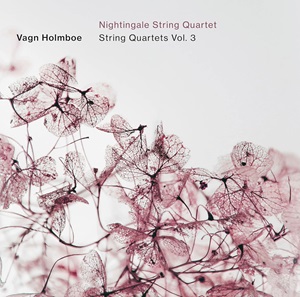
Vagn Holmboe (1909-1996)
String Quartets, Volume 3
String Quartet No 4, Op 63 (1953-54)
String Quartet No 5, Op 66 (1955)
String Quartet No 16, Op 146 (1981)
Nightingale String Quartet
rec. 2021-23, Studiescenen, Royal Danish Academy of Music, Copenhagen, Denmark
Dacapo 8.226214 [63]
This is the third volume in Dacapo’s series of Vagn Holmboe’s complete string quartets. The label also released the first complete string quartet cycle, played by the Kontra Quartet, which was recorded between 1992-2000 and has been very handily summed up by Rob Barnett (review). The first volume in the label’s new series of the quartets (review) contained Quartets Nos 1, 3 and 15, and was in the hands of the Nightingale Quartet, stars of the Langgaard Quartet discography (see review). The second volume contained the Second and Fourteenth Quartets and included his last, incomplete work, the Quartetto sereno, Op 197. As before, in this third volume, early and late quartets sit side by side, the Fourth and Fifth of 1953-55 and the much later Sixteenth of 1981.
The Nightingale takes the Fourth at a rather more expansive tempo than the Kontra, but its seriousness of purpose is audible in every bar. This is, in any case, a decidedly serious work, and a pivotal one in Holmboe’s development, which opens with curiously Schubertian unisons before developing its own brooding sense of power. If the Kontra is the more ‘presto’ in the second movement, the Nightingale generates the necessary emotive charge in the Bartókian central movement (of five), with associated moments of near-desolation. Their tempo decisions are apt, though the Kontra’s offer an equally plausible gloss.
The two performances of the Fifth are almost identical when it comes to tempi. Again, there is something strongly Bartókian about the opening movement, its pesante quality representing Holmboe’s own conception, his sound world generating lithe vitality, with the cello digging in appropriately and earthily. Holmboe’s slow movements are seldom consoling and there’s a rather remote element to them – not chilly, exactly, but close. His finale, though, releases all this pent-up tension in an outpouring of high spirits, its vitality clarified by moments of simplicity, a lively and lovely way to resolve the complexities of this quartet.
No 16 fulfils all the dictates of classical form and its four movements correspond to the Haydnesque ideal. Its moments of neo-classicism are finely structured within the context of a contemporary work, fluidly fast in the Scherzo, and far more outgoing and communicative – and less sullen – than in the earlier works. True, the Adagio is withdrawn, but it’s more conventionally communicative than the earlier works, and the genial and old-fashioned Presto finale brings this work to a resoundingly joyful conclusion. Is this greater élan a weakness in Holmboe’s Sixteenth Quartet, or a refreshing dose of musical generosity?
However you hear it, the Nightingale prove to be judicious guides once again to this resourceful, powerful and sometimes forbidding body of quartets. I’d always want to hold onto the Kontra cycle, as it’s splendidly realised. But it’s a measure of the significance of Holmboe’s chamber works that the Nightingale’s excellently recorded and finely documented discs are so valuable in their occasional divergences and personal takes.
Jonathan Woolf
Buying this recording via a link below generates revenue for MWI and helps us keep free access to the site


















